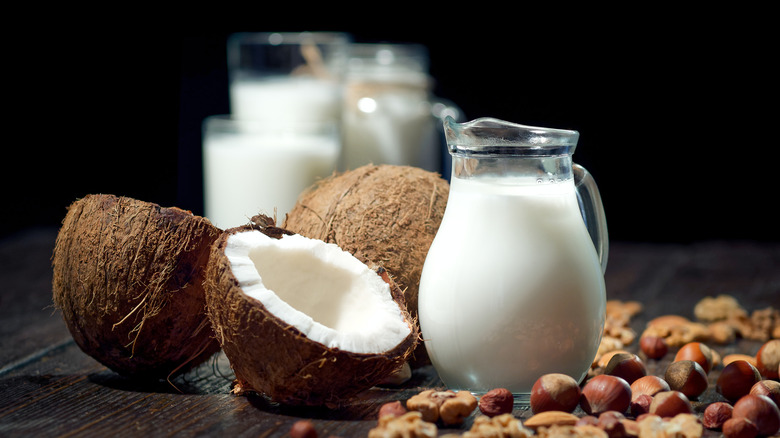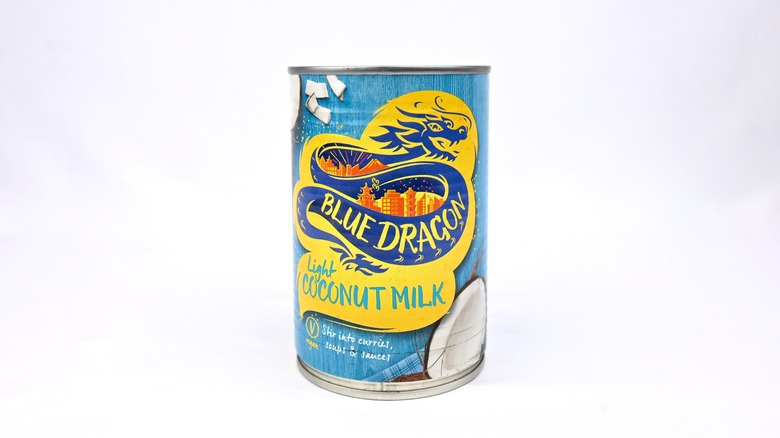The Reason Light Canned Coconut Milk Isn't Worth The Buy
Canned coconut milk can be a wonderful addition to puddings, ice cream, virgin piña coladas, and cooked meals, adding flavor and creaminess to the dish. It's a good substitute for cow's milk, and you can use it in a 1:1 ratio in most recipes. The downside is that it contains over 40 grams of saturated fat and 445 calories per cup. This type of fat can raise bad cholesterol levels, increasing the risk of cardiovascular problems and stroke, warns the American Heart Association (AHA).
One solution is to opt for light coconut milk, which has only 160 calories and 14 grams of saturated fat per cup. Although it's not as flavorful as its regular counterpart, you can use it in any recipe that would otherwise call for cow's milk or full-fat coconut milk. But just because a food is low in fat doesn't mean it's healthier. The same goes for this product, which is basically a watered-down version of regular coconut milk.
Light canned coconut milk has little nutritional value
Coconut milk is a liquid extracted from the flesh of coconuts and may contain a small amount of added water, sugar, and additives. The light version is produced from the bottom part of centrifuged coconut milk, but it may also consist of regular coconut milk diluted with water. In either case, it's much thinner and lower in fat than regular coconut milk due to its high water content. However, water doesn't contain any protein, carbs, or fats. Therefore, diluting a food product with water will diminish its nutritional value. For reference, a cup of full-fat raw, unsweetened coconut milk typically has around 4.6 grams of protein, 6.4 grams of carbs, and 48 grams of fat, plus large doses of iron, calcium, potassium, copper, and other key nutrients. By comparison, light coconut milk provides 0 grams of protein, 3 grams of carbs, and 15 grams of fat (though this can vary, depending on the brand). It contains no iron or calcium, and, therefore, it's generally less nutritious.
Though it has less nutritional value, canned light coconut milk can be a good choice if you want to limit saturated fat. According to the AHA, saturated fat should account for no more than 5% to 6% of our daily calorie intake. Each gram of fat provides 9 calories, meaning we should consume about 13 grams of saturated fat per day on a 2,000-calorie diet. From this perspective, light coconut milk would be a better choice than the full-fat version.
Light coconut milk isn't particularly flavorful
Health aspects aside, light canned coconut milk isn't really worth the money. You can just as well dilute regular coconut milk with plain water to reduce its fat content per serving. The light version is less concentrated and, hence, less flavorful than traditional coconut milk. Plus, it doesn't have the same creaminess as its regular counterpart.
One Reddit user called low-fat coconut milk a "a complete con" after explaining how he bought two cans of coconut milk for the same price — one regular, and one low-fat. The regular version had 75% coconut extract and 25% water, while the low-fat one contained 40% coconut extract and 60% water. "If I used the original recipe but with the low-fat jars, I'd have ended up with a sloppy mess," he wrote. A commenter on the thread pointed out that light coconut milk can work in some, but not all, recipes. For example, you could use regular coconut milk in overnight oats for a silky texture and light coconut milk in casseroles or rice dishes. The low-fat version can impart a subtle tropical flavor to the dish without the extra calories and fat.


